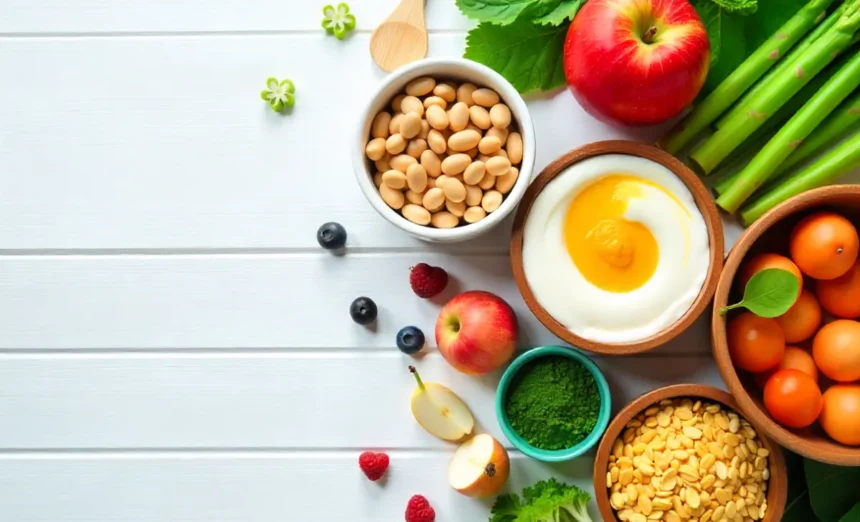Your gut is home to trillions of bacteria that work tirelessly to support your digestion, immune system, and overall health. These microscopic allies play a crucial role in breaking down food, absorbing nutrients, and protecting your body from harmful invaders. Understanding the best foods for gut health and how to nourish these beneficial bacteria can dramatically improve your digestive wellness and quality of life.
The human gut microbiome is incredibly complex, containing more bacterial cells than human cells in your entire body. This diverse ecosystem directly influences your mood, energy levels, immune function, and even your ability to maintain a healthy weight.
Why Gut Health Is Essential for Overall Wellness
The connection between your gut and overall health extends far beyond simple digestion. Your digestive system houses approximately 70% of your immune system, making it your body’s primary defense against pathogens and disease. When beneficial bacteria flourish in your gut, they create an environment that supports robust immune function and reduces systemic inflammation.
The gut-brain axis represents another fascinating aspect of digestive health. This bidirectional communication pathway means that your gut bacteria can influence your mental state, stress response, and cognitive function. Research shows that people with diverse, healthy gut microbiomes report better mood stability, reduced anxiety, and improved mental clarity.
Poor gut health manifests in numerous ways beyond digestive discomfort. Chronic fatigue, frequent infections, skin problems, mood swings, and food sensitivities often trace back to an imbalanced microbiome. Signs of gut imbalance include irregular bowel movements, persistent bloating, gas, heartburn, and difficulty digesting certain foods.
The Power of Fiber-Rich Foods for Gut Health
Dietary fiber serves as the primary fuel source for beneficial gut bacteria, enabling them to multiply and produce short-chain fatty acids that support colon health and overall digestive function. Most Americans consume significantly less fiber than the recommended daily amounts. Women should aim for 22-28 grams daily, while men need 28-34 grams.
The key lies in consuming both soluble and insoluble fiber from varied sources. Soluble fiber dissolves in water, forming a gel-like substance that slows digestion and feeds beneficial bacteria. Insoluble fiber adds bulk to stool and helps food move efficiently through your digestive system.
Excellent fiber sources include kidney beans, providing about 8 grams per half-cup serving. Oats contain beta-glucan, a special soluble fiber that feeds good bacteria while potentially helping lower cholesterol levels. Brown rice, quinoa, lentils, and chickpeas are among the top foods for gut health, offering complete nutrition plus the fiber your gut bacteria need to thrive.
Fruits and vegetables provide natural sweetness alongside essential fiber and micronutrients. Apples contain pectin, a soluble fiber that specifically feeds beneficial bacteria, while pears offer both soluble and insoluble fiber. Leafy greens like spinach and kale deliver fiber plus vitamins and minerals that support overall digestive health.
Probiotic Foods: Adding Beneficial Bacteria to Your Diet
Probiotics are live beneficial bacteria that help maintain digestive balance and support immune function. These friendly microorganisms aid nutrient absorption, produce beneficial compounds, and help crowd out harmful bacteria that can cause digestive problems.
Natural food sources of probiotics often prove more effective than supplements because they contain additional nutrients and compounds that support bacterial survival in your digestive tract. These fermented foods have been processed through traditional methods that create optimal environments for beneficial bacteria to flourish.
Yogurt with live cultures remains the most accessible probiotic food, containing beneficial strains like Lactobacillus and Bifidobacterium. Choose plain varieties without added sugars, which can feed harmful bacteria and counteract probiotic benefits.
Kefir offers exceptional probiotic diversity, containing up to 61 different strains of beneficial bacteria and yeast. This tangy fermented milk drink can be enjoyed plain or blended into smoothies. Many lactose-intolerant individuals can tolerate kefir because fermentation breaks down most lactose.
Fermented vegetables like sauerkraut and kimchi provide probiotics plus fiber and vitamins. Authentic sauerkraut delivers beneficial bacteria while its high fiber content helps reduce bloating. Kimchi adds spicy flavors along with probiotics and antioxidants from garlic and chili peppers. These traditional foods for gut health have been consumed for centuries to support digestive wellness.
Prebiotic Foods: Feeding Your Beneficial Bacteria
Prebiotics are indigestible fibers that specifically feed the beneficial bacteria already living in your gut. While probiotics introduce new bacteria to your digestive system, prebiotics help existing good bacteria multiply and thrive. Think of prebiotics as fertilizer for your internal garden of beneficial microorganisms.
Common prebiotic foods include onions, garlic, asparagus, bananas, and whole grains. Asparagus works particularly well as a prebiotic source because it contains high levels of inulin, an indigestible fiber that specifically feeds healthy bacteria.
Jerusalem artichokes, chicory root, and leeks are especially rich in prebiotic compounds. Simple ways to increase prebiotic intake include cooking with more garlic and onions, which add flavor while feeding beneficial gut bacteria. Snacking on bananas provides natural sweetness plus prebiotic fiber, with slightly green bananas containing more resistant starch.
For comprehensive information about maintaining optimal digestive health, visit this helpful resource that provides additional insights and practical tips for supporting your gut microbiome through dietary choices.
Building Your Gut-Friendly Diet: Practical Implementation
Creating a gut-healthy diet doesn’t require dramatic changes or expensive supplements. Start with simple fiber-rich swaps that gradually improve your digestive health. Replace white rice with brown rice, choose whole-grain bread over refined versions, or add chia seeds to your morning yogurt.
Add probiotic and prebiotic foods to your routine several times weekly rather than daily. This approach prevents digestive upset while still providing beneficial bacteria and their food sources. Try Greek yogurt on Monday, kimchi with dinner on Wednesday, and kefir smoothies on Friday. Incorporating diverse foods for gut health gradually allows your digestive system to adapt comfortably.
Hydration plays a crucial role in fiber effectiveness. Water helps fiber move smoothly through your digestive system and prevents constipation. Aim for at least eight glasses of water daily, especially when eating high-fiber meals.
Conclusion
Building optimal gut health is a journey that rewards patience, consistency, and mindful choices rather than quick fixes or extreme measures. The path forward doesn’t require expensive supplements, restrictive diets, or complicated meal plans. Instead, it centers on gradually incorporating diverse fiber-rich foods, naturally fermented options, and prebiotic sources into your daily routine.
Your gut microbiome is as individual as your fingerprint, shaped by genetics, environment, lifestyle, and the foods you choose each day. This personalized approach means paying attention to how different foods make you feel, noting improvements in energy and mood, and adjusting accordingly while maintaining fundamental gut-healthy eating principles.
Start today by making one small change: add a fiber-rich food to your next meal, try yogurt with live cultures, or cook with extra garlic and onions to naturally increase prebiotic intake. Remember that the most effective foods for gut health are often simple, affordable options available in any grocery store. These seemingly minor adjustments compound over time, creating profound improvements in your digestive wellness, immune function, and overall vitality. Your future self will thank you for the care and attention you provide through these thoughtful, nourishing food choices.
Frequently Asked Questions About Gut Health
1. How long does it take to improve gut health through diet?
Most people begin noticing improvements in digestive symptoms within 2-4 weeks of consistently eating gut-friendly foods. However, significant changes to your gut microbiome can take 3-6 months. The timeline varies based on your starting point and consistency with dietary changes.
2. Can I take probiotics and eat probiotic foods at the same time?
Yes, combining probiotic supplements with fermented foods is generally safe and may provide broader bacterial diversity. However, focus on getting probiotics from food sources first, as they often contain additional nutrients that support bacterial survival.
3. What foods should I avoid for better gut health?
Limit highly processed foods, excessive sugar, and artificial sweeteners. Ultra-processed foods often contain additives that can disrupt beneficial bacteria, while too much sugar feeds harmful bacteria. Focus on adding healthy foods for gut health rather than strict elimination, as positive additions often naturally crowd out less beneficial choices.
4. Is it normal to experience gas and bloating when improving gut health?
Yes, temporary digestive changes are common when increasing fiber and fermented foods. Start with small portions and gradually increase intake over several weeks. If symptoms persist beyond 2-3 weeks, consider reducing portions or consulting a healthcare provider.
5. Do I need expensive supplements for good gut health?
No, excellent gut health can be achieved with affordable, widely available foods. Focus on diverse vegetables, fruits, whole grains, legumes, and basic fermented foods like yogurt. Simple dietary changes provide substantial gut health benefits without significant cost increases.



